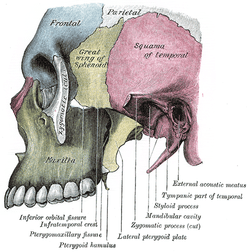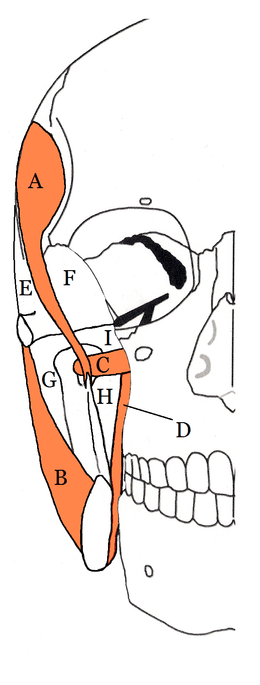Deep temporal space
The deep temporal space is a fascial space of the head and neck (sometimes also termed fascial spaces or tissue spaces). It is a potential space in the side of the head, and is paired on either side. It is located deep to the temporalis muscle
| Deep temporal space | |
|---|---|
 Lateral view of skull, with part of the zygomatic complex removed. | |
| Anatomical terminology |
The inferior portion of the deep temporal space is also termed the infratemporal space. The deep temporal space is one of the four compartments of the masticator space, along with the pterygomandibular space, the submasseteric space and the superficial temporal space.[1] The deep temporal space is separated from the pterygomandibular space by the lateral pterygoid muscle inferiorly and from the superficial temporal space by the temporalis muscle laterally. The deep temporal space and the superficial temporal space together make up the temporal spaces.[1][2][3][4]

Location and structure
Anatomic boundaries
The boundaries of the deep temporal space are:
Superior:
Superior and Inferior temporal lines
Inferior:
Infratemporal crest and Zygomatic arch
Communications
The communications of the deep temporal space are:
Contents
The contents of the deep temporal space are:
Temporalis muscle
Clinical relevance
Odontogenic infection
References
- Hupp JR, Ellis E, Tucker MR (2008). Contemporary oral and maxillofacial surgery (5th ed.). St. Louis, Mo.: Mosby Elsevier. pp. 317–333. ISBN 9780323049030.
- Hargreaves KM, Cohen S, eds. (2010). Cohen's pathways of the pulp. Berman LH (web editor) (10th ed.). St. Louis, Mo.: Mosby Elsevier. pp. 590–594. ISBN 978-0-323-06489-7.
- Topazian RG, Goldberg MH, Hupp JR (2002). Oral and maxillofacial infections (4th ed.). Philadelphia: W.B. Saunders. pp. 188–213. ISBN 978-0721692715.
- Mani, K George Varghese, foreword by Varghese (2008). A practical guide to hospital dentistry. New Delhi: Jaypee Bros. Medical Pub. p. 64. ISBN 9788184482430.